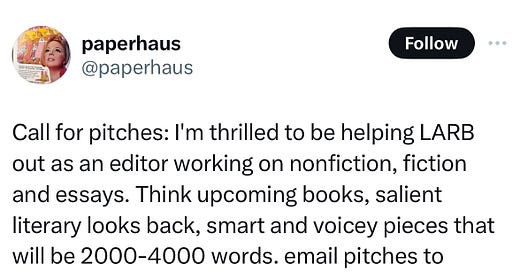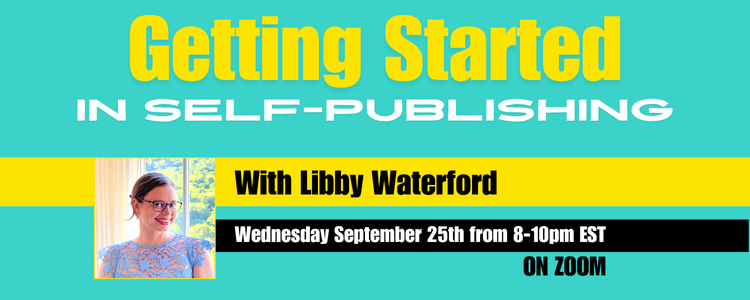At 12:58 p.m. on Friday, I signed out of a Google hangout, where I’d been giving publishing advice to a few emerging writers. Then I went on X and saw this call for pitches:
Paperhaus is the handle of Carolyn Kellogg, former Books editor at the LA Times, and a critic who has served on the board of the National Book Critics Circle.
When I saw this post, I thought, wow what a great opportunity for someone with a literary essay they’re trying to find a home for, when there are hardly any outlets that will publish those! I immediately texted it to the writer who had invited me to speak that afternoon, so she could share it with the others.
Then I read the replies to the post. They all say the same thing.
Can you share the rate?
Just minutes earlier, I had been narrating the origin story of my writing career to these up-and-coming writers: I started publishing poetry and short stories on my Livejournal in the early 2000s. An older writer with an MFA told me, “If you don’t self-publish your poems, you can submit them to lit journals.”
“What is a lit journal?” I asked. (I was 19.)
By the time I was 22, I was a finalist in the DIAGRAM/New Michigan Press chapbook contest.
I happened to be in the right place at the right time: online lit mags were just beginning and they needed work to publish. I was very online, a prolific writer (I wasn’t in college), and good at making friends over email. The online lit magazines that I came up with were non-commercial: more akin to zines than the New Yorker. They were run by volunteers and had low overhead, so there weren’t banner ads or calls for readers to financially support the journal.
At the time, it never even occurred to me to be paid for poetry. In the poem economy, you wrote poems for the pleasure of your friends and you measured your wealth based on how much their poems pleased you in return.
In 2004, my first short story was published. Over the next six years, I published dozens of poems, four poetry chapbooks, and several humor pieces. I was nominated for a Pushcart twice, nominated for Best of the Net three times, and selected for Best of the Web 2010.
In 2010, I sold my first novel, to Melville House, for a $2,000 advance. As far as I can remember, this was the first time I was paid for my writing.
I’m not trying to tell you that back in my day, I walked three miles to school, uphill, in the snow, and kids today are too soft.
I’m trying to tell you that there are some good reasons to publish aside from financial compensation.
I’m trying to tell you that over the last ten years, we have lost so many digital outlets that launched the careers of many millennial writers you love (like Anne Helen Peterson and Caity Weaver). The Hairpin, BuzzFeed News, The Awl, Gawker, VICE, Grantland, MTV News: these are all gone. Romper just laid off its editor in chief.
During this same period, some outspoken writers on the internet led a movement to demand that writers always be compensated for their “labor.” And when a nonprofit literary magazine or organization can’t afford to pay contributors, they have been publicly shamed under the guise of “accountability.”
I see this framing—writing is labor—all the time in the comments section of my own Substack:
The idea that it’s exploitative to publish a poem without paying the poet has killed, by my rough estimation, 95% of those scrappy, volunteer-run literary magazines that made it possible for me, a high school drop out from Illinois, to begin my career.
As someone who went broke running a literary nonprofit for three years, I think we should use common sense to evaluate corporate media conglomerates differently from nonprofit literary outlets.
If Vogue is asking for pitches, you should absolutely ask, “can you share the rate?”
The Los Angeles Review of Books is a nonprofit. Here are a few other reasons you might consider pitching Carolyn, aside from cash money:
The opportunity to work with an experienced editor (which is extremely rare these days unless you’re paying an experienced editor)
The opportunity to publish an essay that you’ve been working on for a long time and haven’t been able to find a home for
The opportunity to publish an essay that’s related to the topic of a book that you’re trying to sell (to a publisher) or trying to promote (to readers)
The opportunity to draw new readers to your Substack, from outside the Substack echo chamber!
You’ll have another piece in your portfolio that you can use when you’re pitching outlets in the future
Another editor may read your essay and commission a piece from you
Come in a time travel machine to the year 2010, when Steve Almond asked Cheryl Strayed if she wanted to take over Dear Sugar at The Rumpus. What if she said, can you share the rate? And Steve said, zero dollars? What if Cheryl never spent two years of her life writing (excuse me, laboring at) a pseudonymous advice column, late at night, while her young kids were asleep? What if she never revealed her identity to her fandom at the exact moment she was launching Wild? What if she never published a collection of her columns and it was never made into an off-Broadway show starring Nia Vardalos or a Hulu miniseries starring Kathryn Hahn?
If you are a subscriber to this newsletter, you are likely a professional writer or someone who hopes to become one. Over the course of your career, there will be opportunities that you pay for, opportunities that pay you, and opportunities that are bets you make on your own future.
Fall Classes
On September 25, I’m offering a class for anyone who’s interested in exploring self-publishing—whether you’re writing fiction, memoir, or poetry—taught by romance novelist Libby Waterford
In October, I’m teaching a four-week plot structure class! Whether you have an idea for a novel that you’ve procrastinated on beginning, or you’re slogging through a draft that sucks, or you’re about to revise a manuscript before you go out on submission again, this class may be for you. We will read two novels and watch two TV shows to learn John Truby’s story structure method. This is not a workshop and you will not have to share your work (or read anyone else’s).
Chat Room
Thank you to everyone who came to my event last week with literary agent Iris Blasi, who spoke about the changes she’s seen over the past twenty years, as writers are expected to do more to promote their own work. The video is available until Tuesday if you haven’t yet had a chance to watch.
I have a lot of great conversations lined up for September:
Friday, September 6th at 1pm EST discussing marketing fiction with Windy Dorresteyn, VP and director of Marketing in the Random House group
Tuesday, September 10th at 8pm EST discussing non-fiction book acquisitions with Kate Napolitano, who was recently promoted to editorial director of non-fiction at Atria
Friday, September 13th at 1pm EST discussing using your story as the backbone for a braided work of non-fiction with the woman who taught ME the term “memoir plus,” literary agent Mackenzie Brady Watson








Excellent advice. I give the same version of it to journalism students I often speak to. Write for anywhere that will have you and edit you. Worry about the money later. Take side jobs, hustle, live with your parents if you have to for a bit. You need the experience before you can demand the pay.
I started my career publishing in poetry magazines that people stapled together on their kitchen tables. Thirty-six years ago, the small Hanging Loose Magazine were the first to ever accept and publish one of my poems. Next year, I'll publish my 8th book with them.